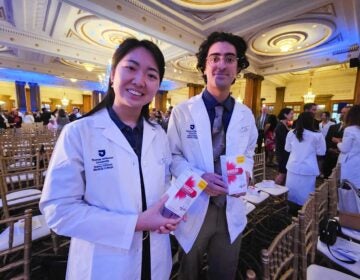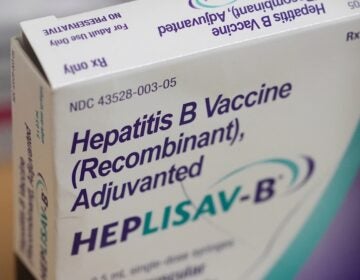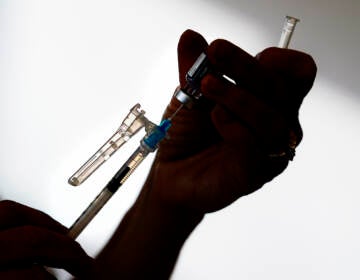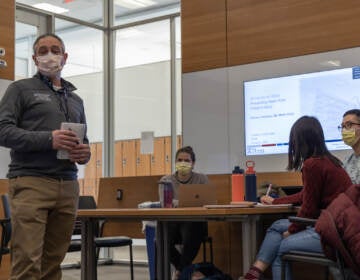RFK Jr. is demanding medical schools teach nutrition. Drexel and Rowan programs say they’re already doing that
RFK Jr. gave all organizations in charge of medical education standards two weeks to include nutrition in licensing exams and residency requirements.
Listen 1:38
Cooper Medical School students work on the Cooper Sprouts Community Garden in 2024. It's an example of a student community service project that focuses on nutrition. (Courtesy of Cooper Medical School of Rowan University)
From Philly and the Pa. suburbs to South Jersey and Delaware, what would you like WHYY News to cover? Let us know!
The U.S. Department of Health and Human Services recently demanded that medical schools teach nutrition, and that the organizations in charge of medical education standards had two weeks to come up with plans to teach it, and include it in licensing exams and residency requirements.
Two local medical schools say they’re ready — because they have included nutrition as part of their curricula for years.
Drexel University’s nutrition curriculum dates back to the late 1990s, said Michael White, professor emeritus of pharmacology and physiology at the Drexel University College of Medicine in Philadelphia. Medical students spend around 20 hours of class time learning about topics like vitamins, food labels, and how to assess a patient’s energy and nutrition needs to have proper food for them during hospital stays.
“Given how much nutrition we already cover, we don’t have much to worry about with that declaration from HHS and the Department of Education,” he said.
He added that the medical school faculty at Drexel considers nutrition to be an important part of health, which is why the program has had it as part of its curriculum for so many years.
Cooper Medical School at Rowan University in New Jersey not only teaches nutrition across various courses, the school also has research projects and community service projects focused on nutrition, said Sangita Phadtare, an assistant dean and professor of biomedical sciences at the university.
For example, students participate in a local community garden to grow fresh vegetables, and they also worked with a local community group to explain to Spanish-speaking residents how to interpret food labels, and how diabetes patients can build healthy meals from dollar-store foods like dried beans and frozen vegetables, if they don’t have cars.
“As a school, we try to do our part because we believe that Camden is our home. It’s not just our workplace,” Phadtare said.
“Even though I would say that we fare well, there is always scope for doing more,” she added. “We personally, as a medical education community, think that nutrition in medical education is important. And even without anybody telling us that, we should be doing that.”

The federal push for more nutrition classes
The U.S. Department of Health and Human Services and the Department of Education announced this initiative at the end of August, urging America’s leading medical education organizations to immediately implement comprehensive nutrition education and training.
In an editorial, U.S. Health Secretary Robert F. Kennedy Jr. said medical schools should adapt to teach nutrition to future doctors, with the same speed that health care providers pivoted to providing telehealth services during the start of the COVID-19 pandemic in 2020.
Kennedy cited research published last year showing that most medical schools did not require nutrition training, and few doctors feel comfortable talking about nutrition with their patients. In the article, Paul Wischmeyer, professor of anesthesiology and surgery at Duke University, declared a crisis among medical schools in the U.S.
Wischmeyer said that while there may not be enough nutrition experts in the U.S. to meet Kennedy’s sudden demand, he’s “thrilled” to see the announcement.
“The recognition finally that nutrition is fundamental to all of our lives and to health care in particular is really an exciting opportunity, one that I’ve really perhaps waited for my whole career to see.”
However, more recent data released in August show that all medical schools in the U.S. already teach nutrition in some form, according to the Association of American Medical Colleges, which represents medical schools.
Osteopathic medicine also recognizes how important nutrition is to health, said Robert Cain, president of the American Association of Colleges of Osteopathic Medicine.
“While not new to osteopathic education, this moment offers an important opportunity to reengage and enhance efforts already underway,” he wrote in a statement.
In a statement, the press secretary for the U.S. Department of Health and Human Services wrote that universities have already begun committing to this change, and that they have received responses from every organization in the U.S. in charge of medical education standards.

Get daily updates from WHYY News!
WHYY is your source for fact-based, in-depth journalism and information. As a nonprofit organization, we rely on financial support from readers like you. Please give today.






